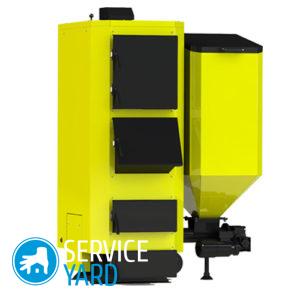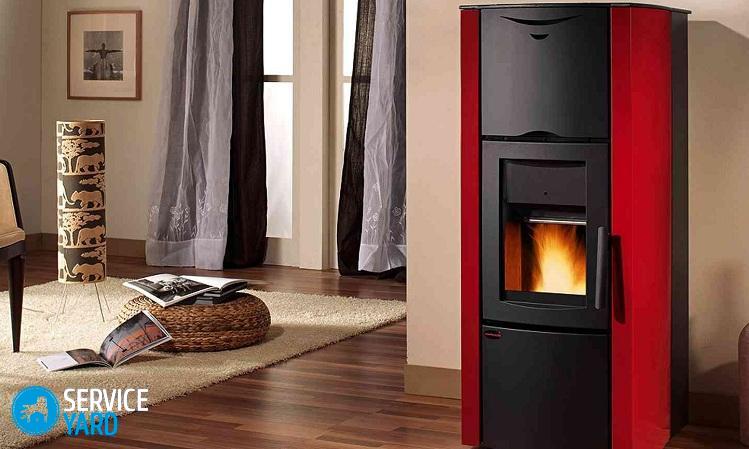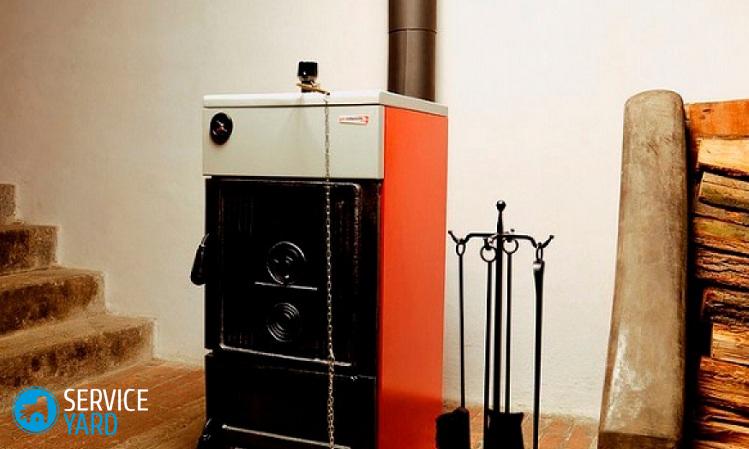How to choose a solid fuel boiler?

Individual heating of a private house or even an apartment or a summer residence is by no means a new solution, but it is gaining more and more popularity recently. The boiler can be either the main source of heat or an additional one. In household appliances stores you will find many interesting models that can vary greatly both in terms of performance and price. How to choose a solid fuel boiler? You will learn about this from the article.
to contents ↑What are the boilers?
On sale you can find two main types of boilers that differ from each other in the type of fuel:
- gas;
- solid fuel.
Important! In addition, no one has canceled electric heaters, but they are still better to use as additional heating appliances. And where power grids are unstable (and interruptions in summer cottages and in cottage villages happen quite often), the use of such a device is not the best solution. The accident at the substation, and all your household freezes in the house.
Gas are more familiar, and many consumers prefer them. Their main attraction is the availability of fuel - gas is cheap, and in addition, such units have existed for a very long time. But solid fuel boilers have many of their advantages.
Important! There are hybrid options when a solid-fuel unit is converted into a gas, if not with a very light hand movement, then with the help of simple manipulations.
Externally, a solid fuel boiler is not particularly different from a stove. Its undoubted advantages include:
- lack of need for gas or gasoline;
- lack of need for energy supply;
- ease of operation;
- an opportunity to receive at the same time warm and hot water;
- fuel availability.
So the question of how to choose a solid fuel boiler for heating a private house is absolutely logical, and the answer to it depends on a number of factors.
to contents ↑What is the difference?
Solid fuel boiler for heating a private house - which is better to choose? Of course, the one that best suits the conditions. But first you need to understand the advantages and disadvantages. To begin with - about the minuses, because it may well turn out that such a device is not suitable for you:
- Need a chimney with good traction.
- Fuel must often be loaded - at least twice a day, or even five times, otherwise it is difficult to ensure continuous operation. But if you wish, you can choose an extra-class model, which has a large firebox that does not require constant “feeding”.
- Smoke can enter the room - a small amount, but some do not like it.
Important! This feature is mainly characteristic of top-loading units.
- Water should be constantly hot, otherwise - a deposit will appear in the firebox, and too much tar will be released from the firewood, which, again, does not suit everyone.
- For some models, preheating is required, which can take quite a while - this is especially true if the house is old and the boiler has been idle for a long time.
- After a full load, the boiler does not immediately give full power.
- The unit does not immediately cool down, for some time after a stop, it continues to generate heat.
- Residual fuel must be removed periodically.
- The camera has to be cleaned quite often, on average twice a month, but in some models - once a week.
- For some models, cleaning is carried out on a warm boiler.
- Plastic pipes do not always withstand the temperature that such a boiler gives.
- Need a cooling heat exchanger and a special valve.
- It is necessary to constantly monitor combustion, not forgetting about the danger of a fire.
Two words about the pros
You already know about some advantages of solid fuel boilers in comparison with gas analogues and electric heaters. But there are others. The following considerations can significantly affect the choice of a solid fuel boiler for heating a private house:
- This is an environmentally friendly device that does not adversely affect the environment.
- It is very easy to get fuel - it can be bought from both the procurers and the hypermarket.
- You can adjust the power and operating time using different boot options.
- The ability to use fuel with different fraction sizes.
- Safety - the possibility of an explosion is completely absent.
- Does not overload the mains.
- Unlike a conventional stove, it does not produce combustion products, so there will definitely not be ash and soot in your house.
What to consider when choosing?
Thinking how to choose a solid fuel boiler for a private house, be sure to consider the following points:
- building parameters;
- boiler power;
- Type of fuel;
- case material;
- the presence of a switching valve;
- the presence of a heat exchanger-cooler.
Building characteristics
The power of the boiler directly depends on the area of the rooms that it has to heat. But you need to consider not only this, but also other parameters:
- wall thickness;
- material of walls and floors;
- the number and size of window openings and doors;
- meteorological conditions - for example, the lowest temperature.
Important! The calculation of the required power is best left to a heating engineer.
This is not always possible, so sometimes you have to do all the calculations yourself. There is a certain algorithm for this:
- Measure the area of the room.
- Calculate the power based on what is 10 square meters. m you need a unit with a capacity of 1 kW.
- Add to the rated power reserve of 1-2 kW.
Types of fuel
Solid fuel boilers come in several forms:
- coal;
- wood burning;
- pellet;
- pyrolysis.
Coal
The coal unit is suitable for a country house, located quite far from the city. In this case, this is the only option, especially if you do not have a wood barn. Coal boiler is a classic of the genre. Its advantages are undeniable:
- high power;
- relatively simple installation of additional devices;
- low fuel price;
- full autonomy.
Firewood
The best way to choose a solid fuel boiler is to evaluate which type of fuel is the most affordable. Firewood is a traditional type of fuel. Getting them to the owner of the country house is not a problem, they can be bought or ordered, or even prepared on their own.
The main minus is that there should be a place for storing fuel on the site. The size of the shed directly depends on how much time you are going to use the boiler in the winter.
Important! It is better to prepare firewood in advance, especially since some models require wood that has matured for a year. Alas, in this sense, the boiler is inferior to the stove, in which you can burn anything.
Pellets
More and more homeowners are choosing pellet boilers. The main consideration that guides them is that pellets are very effective and, at the same time, compact. In addition, they are capable of giving more power. Such a unit will perfectly provide heat not only to a separate house, but also to a small holiday village.
Important! The advantage of pellet boilers is a very high efficiency. Not a single gram of fuel will be wasted. Pellets burn completely.
Pyrolysis Boilers
These are modern and, perhaps, the most effective devices.Their main advantage is the ability to use biofuels, and not only wood, but also agricultural waste. In this case, gas is released, which, in fact, burns, giving a very large amount of heat.
to contents ↑Important! These boilers have a very high efficiency, up to 92%.
Types of loading
Solid fuel boilers also differ in type of loading. She may be:
- automatic;
- manual.
Automatic is more convenient, but installation of additional devices is required - a bunker and an automatic feed. And any additional device means a higher price. The size of the hopper can be anything - it depends on your personal requirements. There are two types of auto-feed systems:
- screw;
- piston.
The auto-feed method has little effect on cost. Automatic feed has its advantages:
- fuel economy;
- constant power;
- lack of need for physical labor.
From fuel to fuel
Now on sale not so often come across models that operate on just one type of fuel. Combined ones are much more common. This is very convenient, because you can adjust the power, depending on external conditions.
Calorie content of anthracite is very different from the same parameter in brown coal or, say, wood chips. If your boiler works on both materials, you can arbitrarily maintain the desired temperature. In addition, it is not uncommon for a conventional type of fuel to be unavailable for some reason. The ability to quickly switch to another, albeit even less effective, will not allow you to freeze even in very cold winters.
to contents ↑Important! The instructions usually indicate the maximum power that is obtained when using the recommended type of fuel.
Material
For the manufacture of casings, two materials are used:
- cast iron;
- steel.
Cast iron
Cast iron boilers have undeniable advantages:
- conduct heat superbly;
- never rust:
- lack of need to clean often;
- insensitive to water quality.
However, they have significant disadvantages:
- complexity of repair;
- fragility;
- heavy weight;
- high inertia;
- sensitivity to make-up water temperature.
Important! When using a cast-iron boiler, cold make-up water should not be fed into the return pipe - the heat exchanger may burst: the boiler must be fed with warm water through the supply pipe.
Steel
This is a very reliable material, which is not affected by a sharp temperature drop. In addition, a steel heat exchanger is much lighter than a cast-iron one. It has less inertia, that is, it heats up faster and cools faster. That is why many buyers prefer steel cases - after lighting the boiler, the house warms up very quickly. But such a heat exchanger needs to be cleaned more often, since its efficiency from combustion products decreases rather quickly.
Important! Steel is cheaper than cast iron, but it is subject to corrosion, so the life of the boiler may be less.
The choice of this or that material depends on who will service the boiler. If you intend to do this yourself, a cast-iron heat exchanger is preferable.
to contents ↑Volatile and non-volatile
In the advertising booklet you can also find such a definition as volatile. What does it mean? A simple thing. The volatile unit has a fan that supplies air to the combustion chamber. He also has a control panel. In general, this is a more complex, and therefore more expensive device.
Important! As a rule, modern pyrolysis models are equipped with such devices. But sometimes fans put on economy-class models, mainly with steel heat exchangers. The main disadvantage is the dependence on electric networks, so the boiler loses one of its main advantages.
Many models can work without a power supply, using natural air circulation. They are less economical, but more universal.
to contents ↑Stock footage
In short, a solid fuel boiler may well become the main source of heat, and you will not need to think about whether your summer cottage is connected to gas supply or have to fiddle with cylinders. In modern stores you can easily find the option that runs on the most convenient fuel for you, while the price range is quite large, so you can always choose a model that matches the financial capabilities of a particular consumer.
- How to choose a vacuum cleaner taking into account the characteristics of the house and coatings?
- What to look for when choosing a water delivery
- How to quickly create comfort at home - tips for housewives
- How to choose the perfect TV - useful tips
- What to look for when choosing blinds
- What should be running shoes?
- What useful things can you buy in a hardware store
- Iphone 11 pro max review
- Than iPhone is better than Android smartphones





